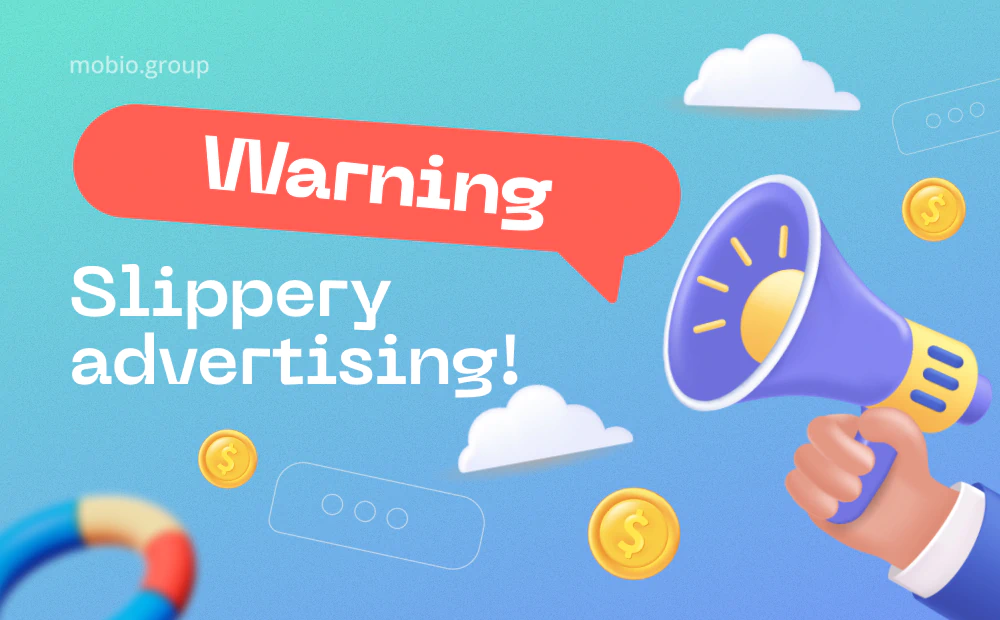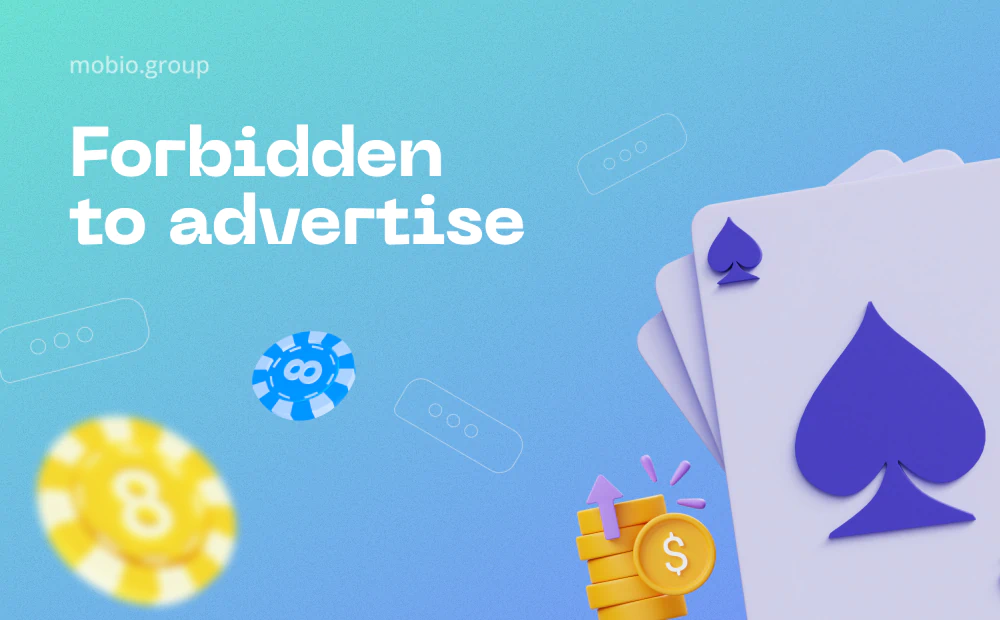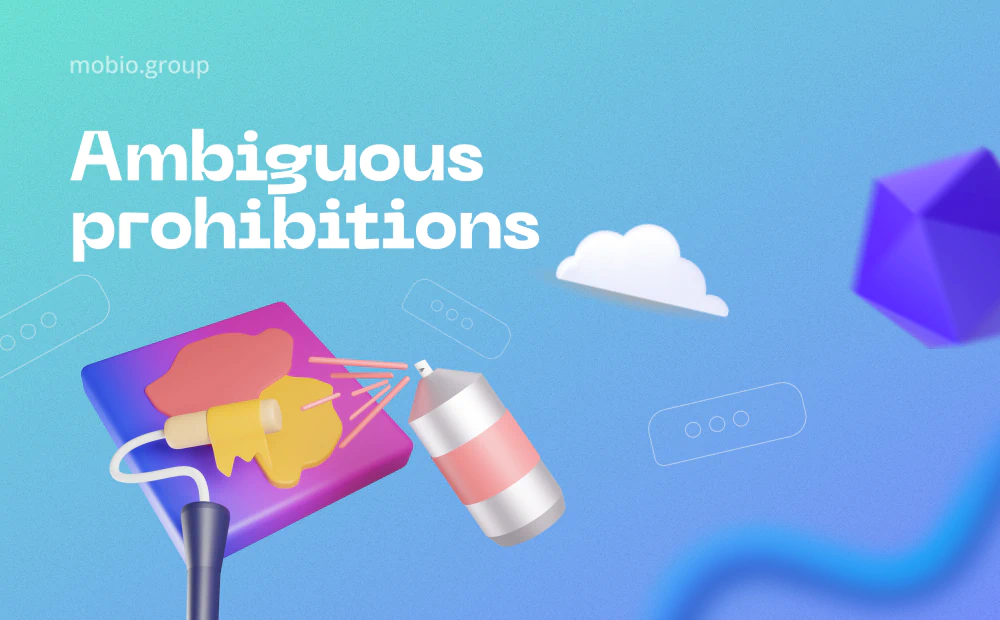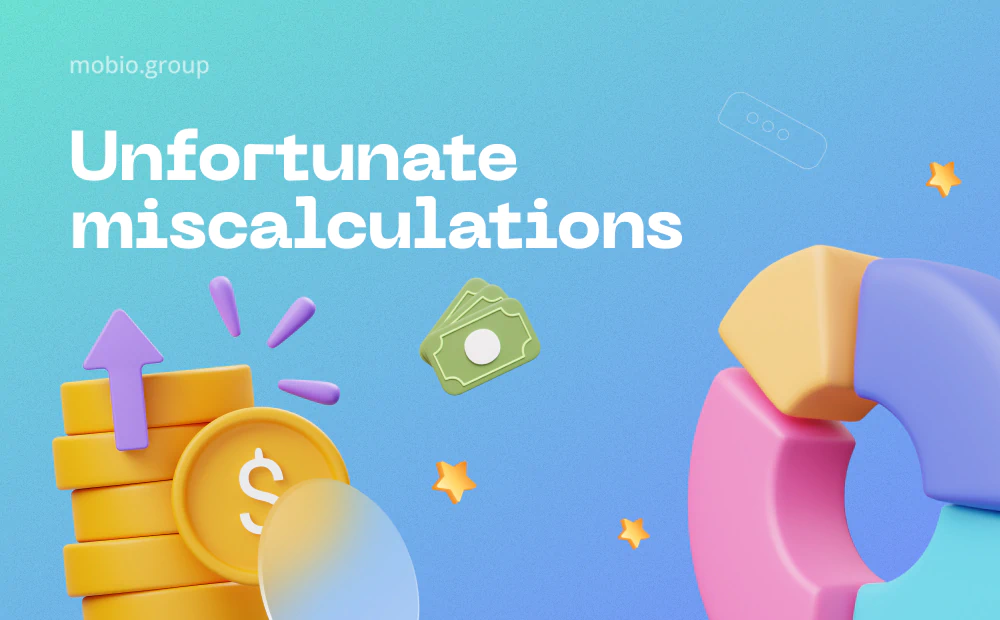Warning! Slippery Advertising! | Mobio Group

People make decisions based on their emotions and reason. It is much easier to evoke emotion than to appeal to reason. Especially using psychological triggers or slippery advertising. Advertising induces a potential buyer to take certain actions, influencing the subconscious by visual, textual, sonic and figurative techniques. The most primitive trigger is greed pressure (“up to 75% off” or “2 days left until the end of the sale”). Advertising skillfully plays with the emotions of users, but also the buyer is becoming more sophisticated, habitually screened from intrusive banner ads and commercials and not responding to calls to action.
People make decisions based on their emotions and reason. It is much easier to evoke emotion than to appeal to reason. Especially using psychological triggers. Advertising induces a potential buyer to take certain actions, influencing the subconscious by visual, textual, sonic and figurative techniques. The most primitive trigger is greed pressure (“up to 75% off” or “2 days left until the end of the sale”). Advertising skillfully plays with the emotions of users, but also the buyer is becoming more sophisticated, habitually screened from intrusive banner ads and commercials and not responding to calls to action.
Today, the purpose of advertising is simply to make the user feel something, thereby attracting his attention to the product. Marketing uses as many tools as possible to achieve this goal, including humor, weirdness, teasers or touching the heart strings. Commercials can be works of art, making you experience a whole range of experiences in a two-minute spot, such as the Chanel N°5 commercial with Nicole Kidman. Although it cost $44million to create the commercial, it has paid off.
Without a big budget, many companies try to stand out and attract the public’s attention with controversial and freaky ads, where the plot of the video or the character is so ridiculous and unpredictable that it unwittingly draws attention to itself. This topic has grown in recent years and has now actually gotten its own name: “oddvertising“.
In advertising practice, shocking, epathetic technologies are used quite often. And it is no secret that the budgets of many advertising campaigns initially include funds for legal action, since the flight of fancy of marketers is closely watched by state and legislative bodies, both territorial and international. For example, advertising of consumer goods on the US market is mainly regulated by the Federal Trade Commission (FTC), in Great Britain operates the Code of Non-Air Advertising and Direct and Advertising Marketing (CAP). The ICC/ESOMAR International Code also monitors and regulates advertising activities. In general, the basic rules and regulations for advertising are identical from state to state, but it’s best to review the advertising codes of the countries where you intend to publish your advertising work.
Advertising sites are legally accountable to the law, so their advertising policies are publicly available for review. Ads are moderated by both automated systems and “manually”. Whether it’s a commercial, a pop-up banner, or a contextual ad, it doesn’t have to violate the law. For example, in 2020 the Italian Communications Authority (AGCOM) fined Google €750,000 for gambling ads on a YouTube channel, deeming them illegal.
What is Forbidden to Advertise?

In addition to the sites that publish ads, advertising producers (agencies) and advertisers are also responsible. Therefore, it is necessary to check all the nuances before launching your ad. Let’s outline regulatory bans:
· Gamblin
Banning advertising for casinos, online slots, sweepstakes, lottery and other related content has become a universal trend in most markets around the world. But it’s not total. In many countries, with a government license for this kind of activity, it is possible to apply for certification on an advertising platform and produce your advertising. With some restrictions, online gambling can be promoted in France, Germany, Norway, and the UK. In the United States, gambling or betting is already legal in several states (Pennsylvania, Michigan, New Jersey). Of interesting features — in Iceland gambling can be advertised only in Icelandic, in Australia – only from 8:30 pm to 5:00 am, in Greece it is forbidden to play music to promote gambling and in New Zealand — the use of cartoon characters. In general, there are loopholes, you need to thoroughly study the local legislation.
· Cigarettes and tobacco products
Including vapes, hookahs, e-cigarettes, etc. Advertising for this type of product is not only banned in most countries, but still has accompanying restrictions.It is possible to get a big fine for putting forward such products as prizes in cultural and sporting events, placing the company’s logo on related products. Even the free distribution of such goods may be regarded as advertising and punishable by law. The fines are enormous — in 2022 Juul Labs agreed to pay $438.5 million for marketing that triggered the teen vaping crisis in the US.
· Financial pyramid schemes
Financial products and services can be complicated and their terms are not always easy to understand. HYIP-projects are prohibited for advertising categorically, and there are many restrictions for promoting different financial services (every advertiser is obliged to study independently the legal norms of the countries where the advertisement will be placed). International organization for protection of financial services consumers (FinCoNet) issued a report, according to which the main reasons for pursuing advertisers under the law is the lack of mandatory disclosure, the consumer does not get the advertised benefit, the inconsistency of headline statements in small print, the lack of a license, etc.
· Alcohol
Some platforms allow advertising of alcohol, but with restrictions on age and depending on the country where it will be advertised, as well as on the percentage of alcohol in the products. There are also self-imposed rules — for example, in the U.S., where alcohol advertising is allowed, do not show people drinking alcohol, although there is no direct ban on it. In turn, the storerooms are full of beer-drinking simulators (iBeer was even in the top 10 in terms of downloads). However, Petal Search warns of its disclaimer of responsibility for the content of the app.
· Drugs, counterfeit goods (replicas), explosives and weapons
Advertisements for health, pharmaceutical, medical, veterinary, baby food, jewelry and fur products are allowed only under certain conditions and in certain situations, taking into account search queries, the age of users and the laws of the country in which the advertisement is shown, as well as content of a sexual nature. It is better to check for compliance with the law and the rules of advertising platforms for any product or service.
Ambiguous Prohibitions

Business on the free market is primarily a competition, and advertising is the main weapon in the fight for the customer. And in the battle for the customer’s attention all methods of influence are used, including provocative ones, balancing on the edge of ethics. Almost any question about the ethics of advertising is controversial, because advertising rarely uses blatant attacks on moral standards. Usually it is done indirectly, in hints, and in semi-tones. And with the conditionality and blurred boundaries of moral standards, it is quite difficult to determine whether a particular commercial is ethical or not.
What are the most frequent violations for which the creators and publishers of advertisements are punished?
- Offensive juxtapositions and images regarding race, nationality, physical appearance, age group, gender, language, profession, social category, religious, political and other beliefs. What is considered offensive is an open question; there are no clear norms. The more famous and public the brand is, the harder it is to maneuver in the sea of opinions and assessment of statements. Nivea has apologized for the seemingly innocent phrase “White is purity” — buyers in the Middle East found it unethical, and All Nippon Airways was forced to remove the commercial featuring a Japanese man wearing a blond wig and a long false nose.
- The use of monetary, national, international and religious symbols. This, however, does not prevent the clothing brand “Jesus Jeans” not only to promote its product through paraphrased biblical quotations, but also to patent the name “Jesus” in the name in 2007. At the same time the leading French clothing and accessories brand Marithe+Francois Girbaud lost the lawsuit of the Catholic High Clergy for the advertising poster based on the “Last Supper” of Leonardo da Vinci.
- Offensive language. The ASA (Advertising Standards Committee) of Great Britain has banned the advertising slogan “Sofa King Low” from the furniture company “The Sofa King” (to understand what the problem is, say the slogan quickly).
- Incitement to crime and cruelty, aggressive content, violence, especially towards children. Wargaming was forced to remove a humorous YouTube commercial in which a father locked his child in a closet while playing hide-and-seek with him and sat down to play World of Tanks.
- A negative evaluation of another organization’s product or company’s product in general and a comparison with another organization’s products. The words “best,” “free,” and “unlimited” should be used with great care in advertising. The National Advertising Division (NAD in the US) has ruled that T-Mobile cannot be advertised as the “most reliable 5G” network. Procter & Gamble’s “Gillette The Best Man Can Get” slogan is not pursued at all.
- Misleading the customer and providing misleading information. Advertising must be accurate and truthful — data about price, discounts, quality and product features must be confirmed. The Federal Court of Australia ordered Samsung Australia to pay a $14m fine for misleading consumers about the suitability of Samsung Galaxy phones (certain models) for immersion in water — in practice, it turned out that sea water is still harmful for gadgets.
There are many bans and restrictions in advertising, but the creativity of marketers is endless. New ideas, approaches and creations are born all the time, as well as lawsuits. Advertisers are trying to keep the balance, balancing between the desire to attract the attention of consumers in any way and the need to comply with the law, with all the ambiguity of ethical evaluations. And yet, adhering to the basic rules of advertising and creative requirements, the advertiser can save himself from unnecessary trouble and unplanned communication with regulatory agencies or angry competitors.
Unfortunate Miscalculations

Advertisers are not always forced to roll back or change an advertising campaign due to consumer complaints and lawsuits over an unethical or unacceptable marketing move. Often, the advertiser himself makes missteps that can bring all efforts to promote a product to naught. What should be considered in the advertising strategy, so as not to slip on the thin ice of marketing:
- When promoting on international platforms, you need to consider the mentality, cultural sensitivities and specifics of the local market. The advertising platforms will usually, with the help of moderation, not allow frankly unsuitable content in the segmentation by country (for example, will reject content of a sexual nature for Saudi Arabia and will allow for Germany with severe restrictions). But an advertiser can be wrong about the very idea of a creative message that won’t resonate with consumers in other countries. For example, the US snack chain Dunkin’ Donuts failed in the international market with a humorous commercial featuring a cop, a late-worker and donuts. This turned out to be an inside joke of America, and the message of creativity buyers in Europe and Asia simply did not understand. Similarly, the slogan “if you stone a woman, only with precious stones” may have a completely different understanding in some Muslim countries than it does in Europe (there are still countries where public stoning is a judicial or extrajudicial form of punishment).
- Takeinto account linguistic differences and do not use literal translations of the original text into foreign languages. An effective and successful expression in one language may turn out to be utterly absurd in another. Thus linguistic differences caused great confusion in the automotive industry, which had to rename the same car models in different countries. Soviet “Zhiguli” became “Lada” in European markets because of associations with the word “gigolo”, the SUV “Mitsubishi Pajero” in Spain is sold as “Mitsubishi Montero”. It’s not just the auto industry that has distinguished itself. Wispa chocolate is not popular in Ukraine (translated as “smallpox”).
- Respect copyrights. Visual, audio or textual elements should be used very carefully in advertising materials, since even music played in the background is protected by copyright law.The advertising platforms themselves are usually interested in not allowing inappropriate advertisements so as not to pay huge fines, and require permission to use copyrighted content when running an ad. If advertising platforms miss an unobvious violation, then automated digital content protection based on artificial intelligence comes into the fight against piracy and plagiarism, which monitors the placement of intellectual property on the Internet and automatically sends pre-trial claims to violators. Copyright issues are very often surrounded by high-profile disputes. Both business giants (Apple vs Google, Gucci vs Guess, Star Wars vs Battlestar Galactica) and private individuals are sued (in Germany, a chef has the right to sue a customer who posted photos of restaurant food online).
Market of every country dictates its own laws, each product requires a special approach to its promotion, each segment of the audience needs specific methods of exposure. The idea of advertising, tone, style and context must be correctly conveyed by specialists, depending on many factors. To create two or three successful advertisements and try to enter the market with them is utopia.
In Mobio Group experience, 200-300 examples per advertising campaign is not the limit for effectiveness (see our case). To attract the attention of possible leads and keep it at a stable level, advertisements also need to be constantly updated and new hypotheses tested, while taking into account all the slippery slopes of advertising. We are ready to lend a specialist hand to help your business navigate the marketing ice without loss.


